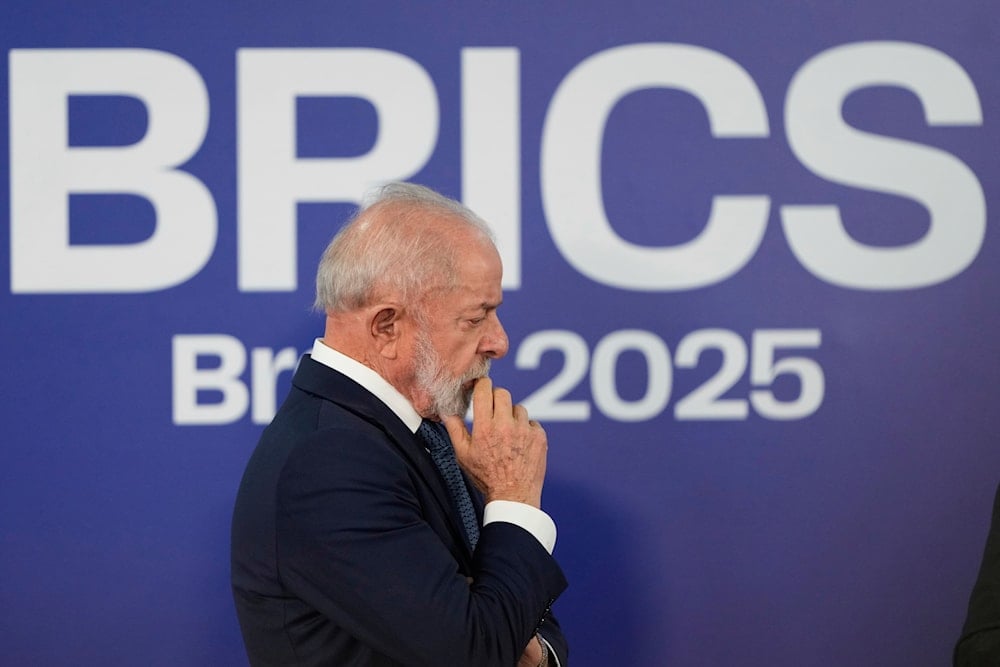Trump’s tariffs on Brazil spark diplomatic crisis: FP
Facing a looming 50% US tariff, Brazil confronts a pivotal moment as Trump’s aggressive trade measures and political interference fuel calls for national resistance.
-

Brazilian President Luiz Inacio Lula da Silva gestures during a press conference at the 17th annual BRICS summit in Rio de Janeiro, on July 7, 2025. (AP Photo/Eraldo Peres)
Brazilians are bracing for major economic fallout as a 50% tariff on Brazilian exports to the United States, announced by President Donald Trump, is set to take effect on Friday, August 1, reported Foreign Policy (FP) on Wednesday. If implemented, it would represent the harshest tariff imposed on any country under Trump's second administration, surpassing Brazil’s previous 10% tariff in April.
Despite attempts by a bipartisan group of Brazilian senators to negotiate in Washington, the chances of reaching a compromise are steadily fading. The development is poised to significantly alter the US-Brazil bilateral relationship.
According to FP, the Trump administration's aggressive posture is not limited to trade. A letter published by Trump on July 9 accused Brazil of conducting a "witch hunt" against former President Jair Bolsonaro, infringing on US citizens’ free speech via tech regulations, and exploiting an unfair trade relationship.
These accusations were followed by aggressive actions: the US State Department revoked the visas of eight Brazilian Supreme Court justices, citing their role in Bolsonaro’s prosecution and censorship policies. The US Trade Representative also initiated an investigation under Section 301 of the 1974 Trade Act, intensifying tensions between the Western Hemisphere’s two largest democracies.
Ironically, the 50% tariff is premised on correcting an imbalance that does not exist. The United States currently runs a trade surplus with Brazil. Imposing the duties would deepen asymmetry and threaten over 100,000 Brazilian jobs while raising prices for American consumers on products like coffee and orange juice.
Economic and political fallout in Brasília
The tariff threats have triggered a nationalist backlash in Brazil. President Luiz Inácio Lula da Silva called Trump’s threats "unacceptable blackmail," stating, "A gringo will not give orders to this president!" He condemned the US actions as violations of Brazil’s sovereignty and judicial independence.
According to the report, the growing crisis also highlights Brazil's lost influence in Washington, where pro-Bolsonaro figures like Eduardo Bolsonaro have gained traction. Lula’s government has yet to establish direct high-level engagement with Trump’s White House since his return to office, while Bolsonaro allies have filled the gap, shaping a distorted narrative that frames Brazil’s judiciary as oppressive.
According to FP, the personal parallels between Trump and Bolsonaro, both of whom rejected election results and incited violent attacks on their nations' democratic institutions, have politicized the US-Brazil relationship. Shared grievances over "deep state" conspiracies and content moderation have cemented a cross-border ideological alignment that threatens diplomatic stability.
Pix, free speech, and the Tech sector’s hidden role
The US' Section 301 probe also references "government-developed electronic payment services," clearly targeting Brazil’s Pix system, a no-cost innovation challenging US-based credit card firms like Visa and Mastercard, according to the report. Meanwhile, Brazilian court rulings holding social media companies accountable for hate speech have fueled pressure from US tech giants for intervention, pushing the Trump administration further into Brazil’s domestic affairs.
Observers note that Brazil’s failure to maintain proactive diplomacy with Washington allowed Bolsonaro-aligned voices to dominate the conversation. In contrast, India, Mexico, and "Israel", among others, have long leveraged diaspora and institutional lobbying in the US capital to protect their interests. Brazil may now be compelled to adopt similar long-term strategies to defend its sovereignty.
The FP report stresses that Trump’s approach has unintentionally produced the “Carney effect”: boosting Lula’s domestic popularity while marginalizing MAGA-aligned factions. It also reinforced a growing realization among Brazil’s diplomats, business leaders, and military that the country must hedge against US unpredictability.
Looking forward, Brazil is likely to deepen its ties with partners in the European Union, China, the Middle East, and BRICS allies such as India and Indonesia. Even if the immediate crisis is defused, Trump’s actions have eroded trust, not just in Brazil, but across Latin America, about Washington’s willingness to weaponize trade and diplomacy for political goals.

 4 Min Read
4 Min Read









